-
03 October 1430 - Jews are expelled from Eger Bohemia
1518 – Cardinal Wolsey sang a mass to Henry VIII and the French ambassadors at St Paul’s Cathedral in celebration of the Treaty of London

1559 – Death of Sir William Fitzwilliam, gentleman of Edward VI’s privy chamber
1568 – Death of Elisabeth of Valois,eldest daughter of Henry II of France and Catherine de' Medici, she married Philip II of Spain.

1569 - Battle of Montcontour: Duke of Anjou beats Huguenots
1574 – The Siege of Leiden is lifted by the Watergeuzen.
04 October 1511 – Formation of the Holy League of Ferdinand II of Aragon, the Papal States and the Republic of Venice against France.

1535 – The first complete English-language Bible (the Coverdale Bible) is printed, with translations by William Tyndale and Myles Coverdale.
1539-The marriage treaty between Henry VIII and Anne of Cleves was finalized

1550 – Birth of Charles IX of Sweden
1582 – Pope Gregory XIII implements the Gregorian calendar. In Italy, Poland, Portugal, and Spain, October 4 of this year is followed directly by October 15.

1582 – Death of Teresa of Ávila, Spanish nun and saint

1597 – The first Guale uprising begins against the Spanish missions in Georgia.
source:http://www.onthisdayintudorhistory.com/,http://www.historyorb.com/,wikipedia
-
02 October 1452 – Birth of Richard III at Fotheringhay Castle, Northamptonshire

1470 – A rebellion organised by Richard Neville, 16th Earl of Warwick forces King Edward IV of England to flee to the Netherlands, restoring Henry VI to the throne.

1470 - Birth of Isabella of Aragon, Duchess of Milan,she was the daughter of King Alfonso II of Naples and Ippolita Maria Sforza. From 1489 to 1494, she was the Duchess consort of Milan, and from 1499 to 1524 the suo jure Duchess of Bari and Princess of Rossano. After her brother Ferdinand II's death, she was the heir of the Brienne claim to the title King of Jerusalem.

1492 - King Henry VII of England invades France
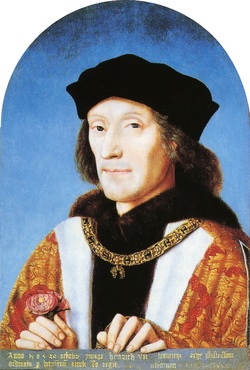
1501 – Catherine of Aragon arrived in England, landing at Plymouth in Devon

1514 – Mary Tudor, sister of Henry VIII, set off from Dover to sail to France to marry King Louis XII

1518 – Treaty of London

The Treaty of London in 1518 was a non-aggression pact between the major European nations. The signatories were France, England, Holy Roman Empire, the Papacy, Spain, Burgundy and the Netherlands, all of whom agreed not to attack one another and to come to the aid of any that were under attack.The treaty was designed by Cardinal Wolsey and so came to be signed by the ambassadors of the nations concerned in London.It was a response to the rising power of the Ottoman empire which was encroaching into the Balkans.
1521 – Pope Leo X was given Henry VIII’s “Assertio septem sacramentorum” or “Defence of the Seven Sacraments”

The Defence of the Seven Sacraments (in Latin, Assertio Septem Sacramentorum) is a theological treatise written by King Henry VIII of England in 1521.
,Henry started to write it in 1519 while he was reading Martin Luther's attack on indulgences. By June of that year, he had shown it to Thomas Wolsey, but it remained private until three years later, when the earlier manuscript became the first two chapters of the Assertio, the rest consisting of new material relating to Luther's De Captivitate Babylonica. It is believed that Thomas More was involved in the composition of the piece.
Author J. J. Scarisbrick describes the work as "one of the most successful pieces of Catholic polemics produced by the first generation of anti-Protestant writers." It went through some twenty editions in the sixteenth century and, as early as 1522, had appeared in two different German translations.
It was dedicated to Pope Leo X, who rewarded Henry with the title Fidei Defensor (Defender of the Faith) in October 1521 (a title revoked following the king's break with the Catholic Church, but re-awarded to his heir by the English Parliament).
Luther's reply to the Assertio was, in turn, replied to by Thomas More, who was one of the leaders of the Catholic humanist party in England.

1528 – Publication of William Tyndale’s “The Obedience of the Christian Man and How Christian Rulers Ought to Govern”

1529-Queen Catherine to Charles V
There came hither with Campeggio a doctor of law, a native of Barcelona, who has been 30 years in the Rota of Rome, and lost everything he had when Bourbon entered the city, so that even now he is in great poverty. Requests Charles to give him some preferment in Naples. Windsor, 2 Oct.

1530-Queen Catherine to Charles V
In behalf of a doctor of law, a subject of the Emperor, native of Barcelona, who came to England with card. Campeggio. He was more than thirty years an officer in the Rota of Rome, and lost everything when the Spaniards entered the city. Windsor, 2 Oct.
1535 – Jacques Cartier discovers the area where Montreal is located.

1536 – Start of the Lincolnshire Rising, which turned into the Pilgrimage of Grace
1538 – Birth of Charles Borromeo, Italian cardinal and saint
1552 – Conquest of Kazan by Ivan the Terrible.
1586 - Battle at Zutphen
source:http://www.onthisdayintudorhistory.com/,http://www.historyorb.com/,wikipedia,http://www.british-history.ac.uk/,http://www.canterbury.ac.nz/
-
1st October 1207 –Birth of Henry III of England
1404 – Death of Pope Boniface IX
1500 – Death of John Alcock, English bishop

1530-The divorce

"Memorial de algunas cartas que se habian de escribir a differentes personas sobre el matrimonio de la reyna de Inglaterra."
The points (apuntamientos) to be written to Micer Mai are as follows: 1. That in the original agreement of the king of England (Henry VII.) with the King Catholic about the marriage of Henry with Katharine, are two or three passages declaring that the marriage with Arthur was consummated, although this is not affirmed in the dispensation. Sends by the first courier a copy of the brief of pope Julius to the king of England upon the dispensation for the second marriage.
The documents which it is now important to produce in the Queen's behalf, and send to Rome, are as follows: 1. The agreement for the second marriage, confirmed by the Kings Catholic, 24 Sept. 1503, ("paso ante Almazan,") at Saragossa. 2. A treaty of the Kings Catholic for peace, and the first marriage, anno '99, with an instruction apart (secretaries Hernan d'Alvarez and Colonna)—at Valencia.
The documents to be presented by virtue of the compulsoriales are the following: 1. The second capitulation between the Kings Catholic and Henry VII. upon the marriage of Henry. 2. The power given by the Kings Catholic to Hernan Duque to demand the 100,000 cr. from the king of England, and to let him (her ?) come to Spain to the Queen con su familia. To search for letters of the ambassador in which he wrote that [the King] does not wish to let her [return], nor to restore her property; and letters of the King himself upon the same subject.
A letter signed by Henry VIII. acknowledging the receipt of 500,000 cr. for the dower of the second marriage, sealed. A bond given by certain Genoese to pay Henry VIII. 45,000 cr. of the same dower. A copy of another letter, signed by a notary, of the payment of 100,000 cr. of the first marriage. An account of the expenditure of 200,000 cr. of the first marriage. This Doctor Beltran took to get authenticated by the notaries. A letter of the King Catholic to the said Doctor ought to be presented, because he says in it that he will have a greater war than against the Turk. The letter of Henry VIII. after his marriage, stating that he was well satisfied, and of his coronation anno 1509. Two letters from Henry VII. respiting payment of the dowry, in which he says that he has forborne to accept some other proposal of marriage, with more money. Also the letter written by the king of England to pope Alexander upon the dispensation for the second marriage, dated 28 Nov. 1504.
There ought also to be presented the letter which Dr. Beltran has, signed by the King Catholic, which he delivered to the archbishop of Toledo.
1532-Chapuys to Charles V.
It seemed from the prorogation of the interview which the French demanded, that there was some suspicion of a rupture, especially as Brian, who was to set out immediately after Langey, had not left; so that Norfolk, who came the day before yesterday to buy silk, and other great men, were not making any preparations. Now everything is settled again, and the Grand Esquire (fn. 1) will go tomorrow, instead of Brian, to wake up the French, and tell them that the King has started; which he will do on Friday next, St. Francis's Day. In order to avoid Rochester and other places where they are dying, the King will go from Greenwich to Gravesend in his barge, and stay there for a day at the house du gentilhomme. There he will embark in the Minion, of 150 tons, and sail to an isle in the Thames, and feast for three days at the house of a gentleman named Chennet (Cheney). Thence he will travel by land to Canterbury and Dover, and cross the sea in the Minion. He expects to be at Calais by the 15th. However cold other people have been, the Lady has been busy in buying costly dresses; and the King, not contented with having given her his jewels, sent the duke of Norfolk to obtain the Queen's as well. She replied that she could not send jewels or anything else to the King, as he had long ago forbidden her to do so; and, besides, it was against her conscience to give her jewels to adorn a person who is the scandal of Christendom, and a disgrace to the King, who takes her to such an assembly; however, if the King sent expressly to ask for them, she would obey him in this as in other things. Though he was vexed at what she said, he did not fail to send for them by one of his chamber, who had letters to the Queen's chancellor and chamberlain as well as to herself. The man told her the King was surprised that she had not sent her jewels, as the queen of France and many others had done. She excused herself, and sent all she had;—with which the King was much pleased.
A week ago the French ambassador, on his way to a feast given by the Lady at a house presented to her by the King, called at Chapuys' house. Showed him a summary of news of the Turkish camp obtained from prisoners. He was not pleased at it, and would gladly have evaded a promise, made before seeing it, to show it to the duke of Norfolk. He revenged himself by discrediting the news, and adding that Neustat was taken, and that 10,000 lansquenetz had been overthrown by the Turks. Heard this afterwards from the Duke while telling him of the raising of the siege of the castle and village of Guns. He was pleased at this, as an opportunity of confounding the Ambassador, who, he says, often tells them fictitious news. He has lately spread a report that the dukes of Bavaria were ill disposed towards the Emperor on account of the bad conduct of certain Spaniards, and threats used by a Spaniard who was sent by the Emperor to ask them for artillery. This is the kind of reports he spreads, either because he wishes them to be true, or to strengthen the pretext for the interview.
Norfolk told Chapuys that he had always been of opinion that the King ought to tell the ambassadors, especially the Emperor's, about this interview, so as to remove suspicion of an intention to attack Flanders while the Emperor was engaged elsewhere. Said this was not likely, as neither King pretended any claim to it. To which the Duke replied that Chapuys' opinion was not very certain, and if they played at "laisser fere François," the contrary would soon be seen; and as to the English, it was not in the King's power to move them against the Flemings, nor the Flemings against them. His conversation showed him to be unfavorable to the French, but he tried to hide it by extolling the friendship of the two Kings. Said that the Emperor was equally rejoiced at their friendship, as he desired nothing so much as the union of Christendom; but as this friendship was excessive, it was dangerous;—supporting the statement by various reasons, which the Duke said he should repeat to the French ambassador. Met the latter today, and he seemed more modest than before, praising the Emperor, and expressing a hope that there would soon be greater friendship between him and his master.
Eight days ago the King met the Princess in the fields, but did not say much to her, except to ask how she was, and assure her that in future he would see her more often. It is certain that the King dares [not] bring her where the Lady is, for she does not wish to see her or hear of her. Thinks he would have talked with the Princess longer and more familiarly, if the Lady had not sent two of her people to listen. There is no likelihood of a treaty of marriage between the duke of Orleans and the Princess, as the King did not speak of it to her. The Princess will be at Windsor during the King's absence. The arrangements for the Queen are not known. The Queen was very much afraid that the King would marry the Lady at this meeting; but the Lady has assured some person in whom she trusts, that, even if the King wished, she would not consent, for she wishes it to be done here in the place where queens are wont to be married and crowned.
Three weeks ago the Scotch king ordered all men between 20 and 60 to put themselves under arms. This is reported by two servants of the Nuncio whom he sent back from Scotland because they were English. 20,000 men have taken the field, and a number of Irish. In England men and horses are continually moving to the defence of the Borders. Some raids have been made, and small villages burned. Many would not think much of invading France, which could repel them much more easily than before; but it seems to many others that the Scotch would have an advantage now from the King's misgovernment, which has alienated all the nobility and people. The Scotch continue in their enterprise, and the French will not stick to the English, and declare the Scotch enemies. The English already begin to murmur that the French are cheating them, and will not continue their cordiality (les Francois les pipent, et ne demeureront cousins).
A man whom Chapuys sent to the Grand Esquire has just returned with a message from him that he is going against his will to France to hasten the interview, and would rather break it off if he could; and that the King is rather vexed that Madame d'Alençon will not come, but instead of her Madame de Vendosme, who will probably bring with her companions of bad reputation, which would be a disgrace and an insult to the English ladies. These people cannot see the mountain in their own eyes, and wish to take the straw from the eyes of others.
The King has ordered general processions to be held three days in the week, beginning at last Ember days. The people came with devout intentions of praying for the Emperor's victory, though the cause was not stated. Thinks it was done from shame, as the French had behaved so well. As to the indulgences, there is no question that the King would have wished to allow them to be published so as to continue his threats against the Pope (pour, comme je croys, continuer a ses braveries contre le Pape).
The duke of Norfolk says that the King has recalled his Ambassador with the Emperor (Cranmer), and sent in his place the archdeacon of Ely (Hawkins), who did him good service when he declared himself Head of the Church, and in everything that has been done and written against the Pope. He was for a long time in prison for Lutheranism, and was condemned to carry a fagot by his uncle, the bishop of Ely. Is sure that he will have instructions and money to procure opinions about the divorce.
It has been determined by the King and his Council that all the ambassadors, except the French, shall remain here, the pretext being want of room at Boulogne and Calais. Is sorry not to be able to go to serve the Emperor there, and fears they will not allow him to send a man, on pretence of his waiting for the packets there, and giving the King anything addressed to him immediately. London, 1 Oct. 1532.
1533-The Divorce.

"The record of the proceedings at twelve sessions of the Papal Commissioners in the matter of the divorce of Catherine of Arragon from Henry VIII.
Begins : In Dei nomine Amen. Per præsens publicum instrumentum cunctis appareat evidenter quod ultimo die mensis Maii, A.D. secundum cursum et computationem ecclesiæ Anglicanæ 1529, Indictione II. Pont. Sanctissimi.
At the end are the separate certificates of the notaries William Claiburgh and Richard Watkyns. Fastened to the latter is a letter testimonial respecting these two notaries, by Nicholas Wootton, dated London, 1 Oct. A.D. secundum cursum et computationem ecclesiæ Anglicanæ 1533. Mention is also made of a seal which has been torn off. Every leaf of the record is signed, R. Watkyns."
-The Princess Mary to Henry VIII.

This morning my chamberlain came and informed me that he had received a letier from Sir Will. Paulet, controller of your House, to the effect that I should remove at once to Hertford castle. I desired to see the letter ; in which was written "the lady Mary, the King's daughter," leaving out the name of Princess. Marvelled at this, thinking your Grace was not privy to it, not doubting but you take me for your lawful daughter, barn in true matrimony. If I agreed to the contrary I should offend God ; in all other things you shall find me an obedient daughter. From your manor of Beaulieu.
1553 – Coronation of Queen Mary I of England at Westminster Abbey

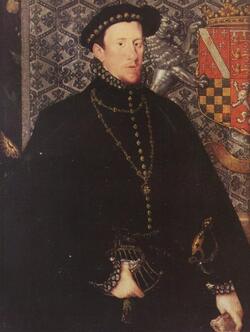
1569 -Thomas Howard, 4th Duke of Norfolk arrested.He was the son of the poet Henry Howard, Earl of Surrey. He was taught as a child by John Foxe, the Protestant martyrologist, who remained a lifelong recipient of Norfolk's patronage. His father predeceased his grandfather, so Norfolk inherited the Dukedom of Norfolk upon the death of his grandfather, Thomas Howard, 3rd Duke of Norfolk in 1554.Norfolk was the second cousin of Queen Elizabeth I through her maternal grandmother, Lady Elizabeth Howard, and he was trusted with public office despite his family's history and leanings towards Catholicism (although he was brought up a Protestant). It was the 4th Duke of Norfolk who commissioned Thomas Tallis, probably in 1567, to compose his renowned motet in forty voice-parts, Spem in alium.Queen Elizabeth imprisoned Norfolk in 1569 for scheming to marry Mary, Queen of Scots.
source:wikipedia,http://www.british-history.ac.uk/
-
30 September 1399 – Henry IV is proclaimed King of England.
1440 – Death of Reginald Grey, 3rd Baron Grey de Ruthyn, Welsh soldier and politician
1487 – Death of John Sutton, 1st Baron Dudley, English politician, Lord Lieutenant of Ireland
1515 – Margaret Tudor, sister of Henry VIII and Queen Consort of James IV, fled to England.
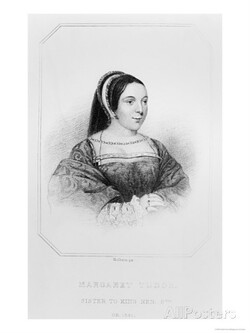
1529-Henry VIII to Clement VII
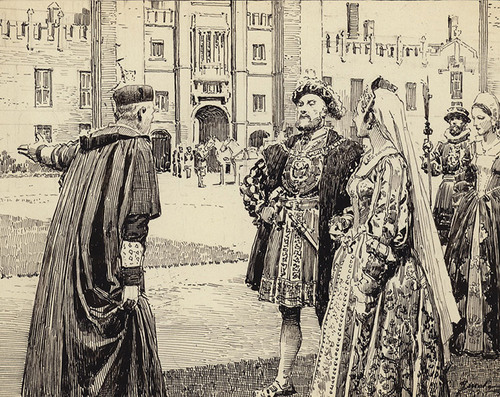
On the return to your Holiness of cardinal Campeggio, we could have wished, not less for your sake than our own, that all things had been so expedited as to have corresponded to our expectations, not rashly conceived, but owing to your promises. As it is, we are compelled to regard with grief and wonder the incredible confusion which has arisen. If the Pope can relax Divine laws at his pleasure, surely he has as much power over human laws. Complains that he has often been deceived by the Pope's promises, on which there is no dependence to be placed; and that his dignity has not been consulted in the treatment he has received. If the Pope, as his ambassadors write, will perform what he has promised, and keep the cause now advoked to Rome in his own hands, until it can be decided by impartial judges, and in an indifferent place, in a manner satisfactory to the King's scruples, he will forget what is past, and repay kindness by kindness, as Campeggio will explain. Windsor, 30 Sept. 1529.
1534-Chapuys to Charles V.
The lord Hussey (Usey), chamberlain of the Princess, who for his good sense and prudence was one of the principal councillors of Henry VII.; desiring of late to go home to the North, sought a secret interview with me before his departure, when he told me plainly what he had before expressed more covertly, that he and all the honest men of the kingdom were very much dismayed that your majesty did nothing to remedy affairs here, as it could be done so easily,—that the thing concerned the lives and interests of the Queen and Princess and the honor of your majesty, and that it was God's cause, which you, as a Catholic prince and chief of other princes, were bound to uphold, especially out of pity for all this people, who regard you with as much affection as if they were your own subjects. I told him you were desirous of the peace and union of Christendom, and to preserve the ancient friendship with this king, for which there was no better means than to maintain the rights of the Queen and Princess, and wait the other terms of justice in discharge of the oath you had made to this king; and I thought that even if your majesty had every opportunity to remedy affairs by war, nevertheless you might object to do so for fear of oppressing this innocent people ; and as he was a wise and experienced man, I begged him to declare what he would do if he were in your majesty's place. He said, as to the disposition of this kingdom, I might know it in part as well as he ; nevertheless he would assure me that almost everybody was expecting your majesty would begin to move to their assistance, and you need have no fear of oppressing them by making war, because the indignation of the people was so great that everything would be reformed immediately before any resistance could be offered. As to the form of the war, as you had experienced soldiers, he would not enlarge upon it, especially as he knew that lord Darcy, whom he called his brother, would explain the matter for me much better than he could, being a person of long experience in the business. One thing he would not forget to say, that your majesty ought first of all to make the said war, which might at once remedy everything, by the insurrection of the people, who would be joined immediately by the nobility and the clergy also, which is powerful and half in disorder.
Yesterday, just after this interview, I sent to lord Darcy by one of my confidential servants, who, after conversing about other things, began to speak of the above matters, conjuring him to keep it secret, as it might cost him his life. He said he considered himself as one of the most loyal vassals the King had in matters which did not injure his conscience and honor, but that the things treated here were so outrageous against God and reason that he could not hold himself for an honest man or good Christian if he consented to them, especially in matters which concern the faith, and that in the North he knew well there were 1,600 (“sez C”) earls and other great gentlemen who are of his opinion, although he had only declared himself to one or two, and had not even given any indication of his mind to his two sons, who are as valiant in arms as any in the kingdom. The younger has just been made captain of Jersey (lisle de Jerce). The said lord intends, by leave of the King, shortly to go to his own country ; and as it was proposed that measures should be taken in this parliament to introduce the Lutheran sect, he and his adherents would do their best to animate the people against it. With the assistance of your majesty he would raise the banner of the Crucifix together with yours, and among the first things he would do would be to seize some lords who favoured these follies, such as the earl of Northumberland and some others. The assistance he desired from your majesty would be, first, that you should have intelligence with the king of Scots that he might make an invasion while they were bestirring themselves, and that you should send some small force to the mouth of the Thames to give fight to those hereabout. It would be necessary also to bring a small number of harquebus men to the North, with harness and other munitions of war, and some money for poor gentlemen who lack means to equip themselves, lest they should be gained by the King ; for in the North there were great lords, but they had no money to advance to others ; and as to the said lords, they would not care to take money, but would readily spend their own. For himself, he would put in the field 8,000 men of his own and his friends', and he begged for the honor of God that I would not sleep in the matter, in which I would do the best service both to God and your majesty. In the end he told my man that before he left here he would consider more particularly the whole subject, and communicate his intention to me or to my said man. I shall not fail to spy out an opportunity. I hold it certain that there are innumerable lords who would say as much as he if they dared. Of those who take part with him he named two, who are among the most powerful of the kingdom. The one is the earl of Derby (conte dAlby), the other lord Dacres, who has little reason to be satisfied with this king, nor with those who manage affairs ; for although he has been declared innocent of the charge brought against him, the King, besides taking away all his offices, retains his goods both in ready money and moveables, worth more than 50,000 ducats.
No news from Ireland is known since my last, though some has been received at the Court. I am told that part of the men that Skeffington took with him deserted, which he made his excuse for delaying to cross. The King, however, is displeased with his delay, and has sent him express orders to leave by the first wind, whatever comes. One of the King's two ships of which I wrote has already gone down the river, the other will not delay long. It is sent to discover who goes and comes in Ireland.
The day before yesterday a German arrived here with five servants, who I hear came from Antwerp, and did not wish to be known there. Some say that he belongs to the duke of Saxony, others to the duke of Lunenburg, seeing that he speaks Low German. He went yesterday through the town accompanied by some servants of the doctors of Lubeck and Hamburg. I will endeavor to discover who he is. 30 Sept. 1534.
1538-The Two Marriages.
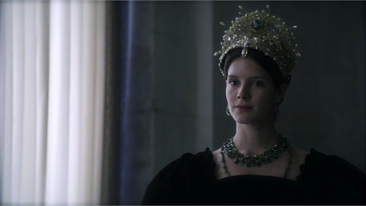
Memorandum respecting Henry VIII.'s proposed marriage with the Duchess of Milan and that of the princess Mary with the Infant Dom Loys.
The Emperor's wish is, first, that his ambassadors in England grant nothing against the Church or the authority of the Apostolic See, nor against the Princess' rights to the succession; that the Infant and Princess be not compelled to sign anything against the Church or Apostolic See; to know what dowry he proposes to give the Princess; that the king of Portugal is ready to maintain his brother in a princely state, and the king of England ought rather to look to the personal merits and age of the personage than to his material wealth; that the Emperor guarantees all promises made by the King and Infant of Portugal, and will be glad to enter into an offensive and defensive league with both states, and so will the king of the Romans. Should the king of England suggest ratifying the last treaty, the ambassadors shall decline on the plea that there are articles therein which do not concern Portugal or the king of the Romans. Should the king of England hint at a new league, they shall listen to his proposals without accepting or rejecting any terms, however hard they may appear. To grant nothing touching old confederacies with Scotland. To secure the succession to the Princess in case of the King dying without male or legitimate issue. To procure that the King shall assign to the Princess the largest dower possible on some estate which she herself may enjoy, besides a considerable sum of ready money; and to have the dower properly valued, so that in the event of the King's death she may know what to claim.
The ambassadors shall remember:—(1) that the king of England will gladly declare against the Turk provided the Emperor will declare against the Pope; (2) that the King refuses to declare the legitimacy of the Princess, but will declare her heiress to his throne, should he die without legitimate children, and that in any case she shall be preferred to the daughter of Anne Boleyn, the beheaded Queen; (3) that he offered to give her 100,000 crs. down and 20,000 crs. a year as dower, which his ministers have since reduced to the 100,000 crs. only. The Imperial ambassadors said that for every 100,000 crs. Henry gave, the Infant would give 5,000 as a marriage portion; but nothing was fixed, and the King's consignment was originally made upon the lands of suppressed monasteries and not in ready money. On the other hand, the King stipulated that the Emperor should defend him against the Pope, that the Council should not be held at Cambray, and that wherever" held, nothing should be treated therein to his detriment. The ambassadors tacitly owned that the Emperor intended to give Milan to the Infant; and this so pleased the King that he at once offered money to defend him against his enemies, and also to declare against the Turk. The King, nevertheless, requested that the investiture of Milan should be delayed till after the conclusion of the marriages. Since then the Emperor had offered Milan to the King on condition of his making a league offensive and defensive; but the English excused themselves on the plea of expense, the Emperor having so many enemies.
ii. The King's marriage with the duchess of Milan.
Cromwell first suggested it to the Imperial ambassador (Chapuys), and proposed that of the prince of England with the Emperor's daughter (Mary) and of the King's daughter by Anne Boleyn with the son of the duke of Savoy or of the king of the Romans. The proposal being renewed, the Imperial ambassadors declined to treat of such marriages on account of the youth of the parties, &c.; but said that, if the King would treat of his own marriage with the duchess of Milan, the Emperor would give her 100,000 crs. as dowry and 15,000 crs. a year, together with her rights to her mother's inheritance, and would endeavour to get the countess Palatine to cede to her her right to the crowns of Denmark and Norway, and even, if necessary, aid him in the conquest of these kingdoms. The King, thereupon, asked for an increase of the dower and marriage portion, and that it should be assigned upon Flanders, as Milan was not secure, and said he did not care for the rights the Duchess might have to Denmark. The ambassadors replied that the dowry was sufficient, and that the King ought not to insist upon such trifles. They also offered that the Emperor should mediate between the Pope and the King; but this the King would not hear of. The King then asked the investiture of Milan for his daughter, and the ambassadors replied that Milan could not be disposed of without the consent of the Italian powers; and, moreover, there was nothing to fear in that quarter, since in the agreement with king Francis there was nothing to his detriment.
In a despatch, addressed to the queen Regent of Flanders, Don Diego says that in treating the marriage between the Princess and the Infant great care should be taken that she be declared legitimate, and if the King will not agree to that, no mention of his refusal must be made in the marriage contract, so as not to hurt her right to the succession. To insist, however, upon the largest possible dower, she being daughter of queen Katharine, who had 200,000 ducats. That it would be well to draw out a secret protest that in treating the marriage her rights to the succession are not to be impaired. The Emperor writes approving his ambassador's answers to the King's two proposals, viz., that the Emperor should not consent to the General Council, and that he himself is unwilling to declare the legitimacy of his daughter. The answers were that the Emperor could not make such a promise, as it was against God and reason, and that if the King would not acknowledge his daughter's legitimacy, he was at least bound to reserve her right to the succession in default of other children.
In a letter of 28 July 1538 the Emperor writes that the English ambassador had asked him to urge on the said two marriages, and that, even if the other were delayed, the King's with the duchess of Milan should be proceeded with; making no objection to the Emperor's voluntary disposal of Milan, and offering to contribute to its defence provided full powers were sent to the queen Regent to treat of his own marriage with the duchess of Milan. The Queen is to endeavour to discover what the King means by this new proposal, but, in order not to displease the king of France, she is to conclude nothing without first letting the Emperor know; much less arrange an interview with the King at Calais or elsewhere, which the English ambassador seems anxious for, or make any definitive agreement with respect to Milan, for the French have not yet lost all hope of getting possession of it somehow. Should the King or his ministers mention it, the Imperial commissioners must reply that, as the King's answer to the Imperial ambassadors on that point had been both cold and unmeaning, it was necessary that he should make a new declaration of his intentions therein within a fixed period; not forgetting to state that the Milan question is open to many considerations. The English ambassador with the Emperor has complained that his master was not expressly comprised in the treaty of Nice, saying, "Perhaps, by not mentioning my master in the treaty of Nice, the object was to show that he is not a Christian king, since he has denied obedience to the Church of Rome?" The ambassador again requested that the Emperor would engage that nothing to the King's detriment should be discussed in the General Council. The answer was that such a request was unreasonable. The ambassador also requested that particular instructions should be sent to the Queen Regent touching the dowry and rights of the Duchess, besides the cession of Denmark. This was promised. He also spoke of the defence of Milan, and was told that the assistance proffered is now subject to other considerations, as circumstances have greatly altered; also that if the marriages were to go forward he must proceed more seriously than hitherto.
The Emperor's resident ambassador in England (Chapuys) writes, on the 31 August 1538, that the King objected to the powers sent to the Queen, on the ground that they were insufficient to treat of the marriage between the Infant and the Princess, which was the principal point of the two, that the Emperor did not know what property the Infant had to offer as security for the Princess' dower, and had not received, from the Infant, sufficient powers to proceed. Moreover, Henry wished the negociations carried on in England through the medium of the queen of Hungary. The Emperor's answer was that the English ambassador at his Court had seen the powers, and that Dom Loys himself would not contradict any statement made by the Emperor. Chapuys also says that the King, by declaring the Princess' marriage to be the more important of the two, shows clearly that his aim is to create jealousy between the Emperor and Francis about Milan. Cromwell must have said somewhere that a marriage was in contemplation between the duchess of Milan and the young duke of Cleves, and that it was a reflection on his master to be refused for a Duke; also that, once in possession of Milan, his master's affairs would go on well, and everything else be settled. The King, moreover, said to the French ambassador that he would have Milan in spite of any prince, and that it had been actually offered to him even after the interview at Aigues Mortes.
1541 – Spanish conquistador Hernando de Soto and his forces enter Tula territory in present-day western Arkansas, encountering fierce resistance.
1544 - King Henry VIII draws his armies out of France after his victory in Boulogne.
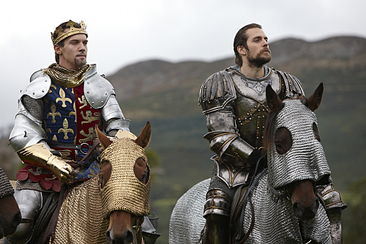
1553 – Mary I’s coronation procession from the Tower of London to Whitehall.

1555 - Bishop of Oxford Nicholas Ridley sentenced to death as a heretic

1585 – Philip Howard, Earl of Arundel and son of Thomas Howard, 4th Duke of Norfolk, was received into the Catholic Church by Jesuit William Weston at Arundel Castle.
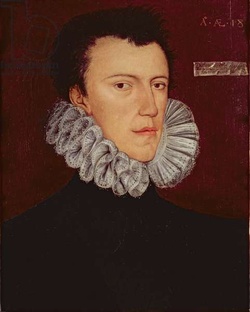
source:wikipedia,http://www.onthisdayintudorhistory.com/,http://www.historyorb.com/,http://www.british-history.ac.uk/
-
29 September 1528 – The papal legate, Cardinal Lorenzo Campeggio, landed at Dover on the Kent coast. He had arrived in preparation for hearing the case for the annulment of the marriage of Henry VIII and Catherine of Aragon.

1548 – Birth of William V, Duke of Bavaria

1560 – Death of Gustav I of Sweden

1564 – Robert Dudley was made Earl of Leicester.

1567 – At a dinner, the Duke of Alba arrests the Count of Egmont and the Count of Hoorn for treason.
source:wikipedia,http://www.onthisdayintudorhistory.com/,http://www.historyorb.com/,http://www.british-history.ac.uk/




